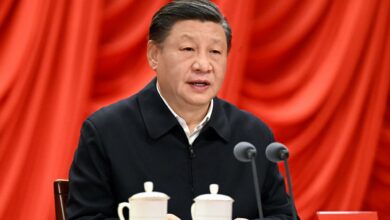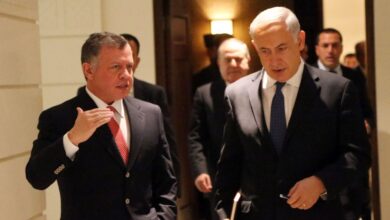NEW YORK — Israeli Prime Minister Benjamin Netanyahu said Thursday he intends to “confound” critics and skeptics and make peace with the Palestinians — but he said he needs a partner.
Netanyahu challenged Palestinian President Mahmoud Abbas to sit down with him. If he does, the Israeli leader said a peace agreement could be reached in a year.
Netanyahu’s message to Israelis, Americans and the wider world two days after patching up relations with President Barack Obama was that he became prime minister for a second time to take “political risks” for real peace.
He told several hundred people at the Council on Foreign Relations that it’s time to stop putting conditions on direct Israeli-Palestinian talks and start negotiations “now, next week, in two weeks.”
“We’re ready to make far-reaching concessions today, and the best way to test that is to start negotiations,” Netanyahu said.
The Palestinians agreed to begin indirect talks in May with Israel through U.S. envoy George Mitchell. But they are demanding a halt to all Israeli settlement activity in the West Bank and east Jerusalem — captured territories they claim for a future state along with the Gaza Strip — before direct talks begin.
Netanyahu announced a 10-month slowdown on construction in West Bank settlements that ends in September, which he called unprecedented. He also has imposed an unofficial construction freeze in east Jerusalem, but the Palestinians want a permanent halt.
In Cairo, the head of the Arab League said Thursday the indirect talks are failing and there is a little chance for a shift to direct negotiations. Amr Moussa, a former Egyptian foreign minister, said senior Arab diplomats will meet July 29 to evaluate the results of the indirect talks.
Netanyahu said delaying direct negotiations “is a big mistake” that’s cost both sides about a year.
He repeated his vision of “two states for two peoples in which a demilitarized Palestinian state recognizes the Jewish state of Israel.”
The Israeli leader said two elements are crucial — an “enormously powerful” security pillar to guarantee that there would be no rolling back on an agreement, and Palestinian declarations to their people that “Israel will be here to stay” as a Jewish state.
“I think we should seize the moment … when we have the ability to negotiate a peace,” Netanyahu said.
The 60-year-old Netanyahu said “when you get to be my advanced age … you come back to do something.”
“I’m prepared to do something,” he said. “I’m not prepared to take risks with our security but I am prepared to take political risks.”
Abbas must also be prepared to take risks, Netanyahu said.
“I intend to confound the critics and the skeptics,” Netanyahu said. “I need a partner.”
Netanyahu was asked what would happen with Hamas-ruled Gaza if he reached an agreement with Abbas’ Palestinian Authority, which controls the West Bank.
He called it “a big problem” but said peace negotiations should move ahead between Israel and the Palestinian Authority, and “proper precautions” should be taken once an agreement is reached.
Netanyahu added that “Iran’s proxies” in Gaza and southern Lebanon pose “a real problem” and he recalled how 14 years ago he called Iran’s nuclear ambitions the greatest threat to the world today — a view he still holds.
“Obviously, we hope that it’s possible to stop Iran’s programs by this U.S.-led effort to put maximum pressure” on the Iranians, especially their main energy sector, Netanyahu said.




